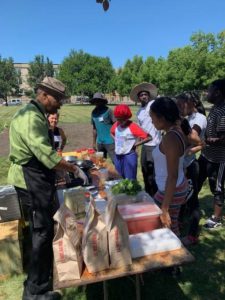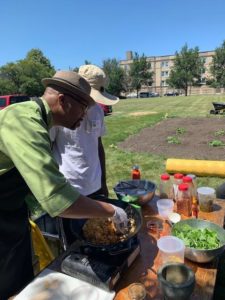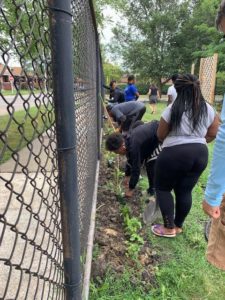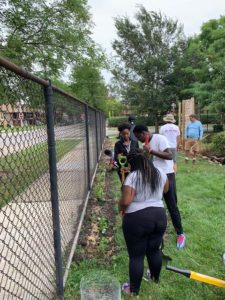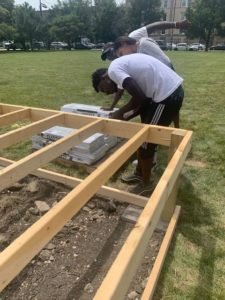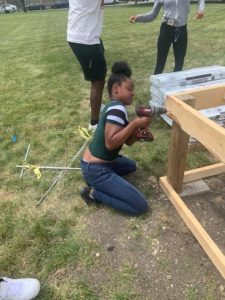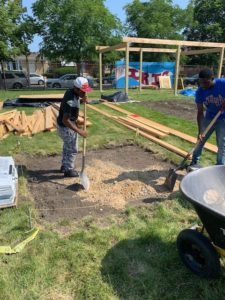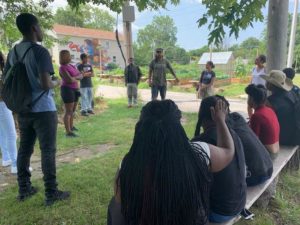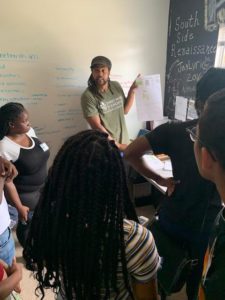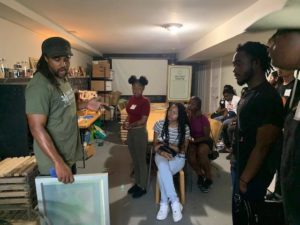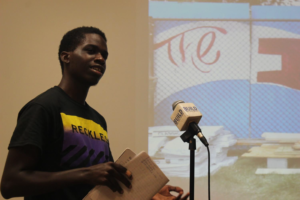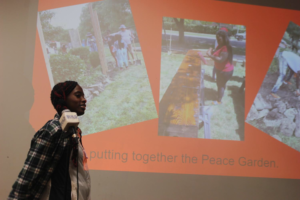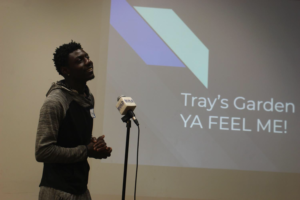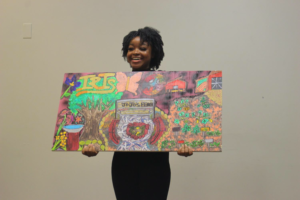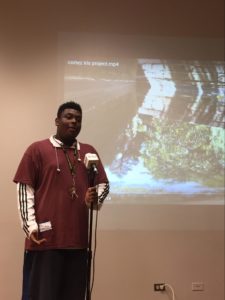
“The Iris” Urban Agriculture Program Blossoms at BUILD
Some young people spend their summers hanging out at the pool. Some head off to sleepaway camp. And some choose to immerse their sun soaked days in learning a lost art—growing your own food.
BUILD’s “The Iris” urban agriculture initiative started off as small garden project, a medium to teach young people a new and practical skill, and a novel hobby for retired IT professional and BUILD volunteer Peter Todd. The project began humbly, in true “DIY” fashion as Pete and his involved young people watched YouTube videos on how to measure plots, till soil, and of course, best begin to grow fruits and veggies.
The “garden” can now be appropriately classified as a small farm. With almost 30 different crops, a greenhouse, and a hand-built shed appropriately outfitted to look like a mini barn, The Iris has become much more than your average community garden. As if that weren’t impressive enough, our young people have even been working on constructing a chicken coop!
The most important seeds however, are not planted in the ground; but in the fertile minds of BUILD’s youth participants. An absolute powerhouse of a STEM experience, our young people have been learning and polishing skills that few kids born in the city would ever dream of.
It is one thing to learn how to plant and grow food. It is one thing to learn how to design and build a shed or a greenhouse. However such a foray would be incomplete if we did not teach and discuss what all was being built and planted meant. This summer, in addition to the hands-on component of The Iris project, youth learned about food justice, sustainability, the economics of green jobs and the food sector. This component was led by Ana Garcia-Doyle, director of One Earth Film Festival, and partner of BUILD. Garcia-Doyle taught our young people about how individuals impact their planet, and their communities.
“By us planting all these fruits and vegetables, we can have the community come in to pick out the fruits and vegetables for themselves, so they can take it back home and cook, actually use and benefit from the resources we provide for them,” participant LaTania Reed said when asked about why the Iris project is important to the community. “I feel like I could inspire somebody else to eat more healthy like I do and do some of the things we’re doing right now, like planting and growing your own fruits and vegetables at home.”
Participant Cortez Dean said, “I’ve known about food deserts, and it feels good to know I’m bringing something to the community. It’s not even about getting paid at this point, now I feel like I’m doing it just to do it.” Dean has been with the program since its inception, and notes how cool it has been to watch this project grow from its humble beginnings, into something attracting attention from all over the city. (Listen to Cortez’ podcast about his experience HERE.)

(Pictured left are BUILD’s Iris summer participants with Chicago mayor Lori Lightfoot, who stopped by to see how our crops were coming along!)
Other youth echoed the accessibility, or “DIY” nature, of the garden/farm project. When asked his thoughts on the experience, BUILD youth Michael Devine responded, “I love doing garden. It’s something anyone can just do. If you have nothing to do just go out and do it! It helped me out more than I thought. I’ve learned a lot of new stuff. So I’m glad we’re doing all of this.”
It has been truly a marvel to watch BUILD’s Iris expand and expand. There are few more important things we can give our young people than opportunity; and being a part of The Iris has given BUILD participants the chance to learn science, to learn how to use different technologies, to design plots and structures with mathematics, and build them themselves. This has instilled confidence, and valuable real-life skills. And perhaps most importantly, the opportunity to provide fresh “austin-grown” produce to their communities.
Take a peek at some of the experiences our Iris Urban Farm youth had the opportunity to learn from this past summer:
The one and only Chef T of the Majani Food Emporium in South Shore came to teach, discuss, and cook! Discussion topics included sustainable food systems, food justice, farm to table/seed to plate, and food-sector green jobs/economic opportunity. Afterwards he helped participants prepare their own plant-based taco salad with tortilla chips and ginger lemonade!
Youth learned about pollinators and the plants they pollinate. The crew then set out the pollinating plants and started to plant them along this gate. These plants will attract all types of pollinators like bees and butterflies, essential to growing ecosystems.
The OSC Iris crew working on the chicken coop. First they measured the area, then they removed all the grass and evened out the measured areas. They dug out holes for the posts, and started measuring the wood and assembling the coop.
The Iris crew visited the Sweet Water foundation on the south side, and learned all about their impressive and important work. Sweet Water Foundation practices Regenerative Neighborhood Development, a creative and regenerative social justice method, that creates safe and inspiring spaces and curates healthy, intergenerational communities that transform the ecology of once-”blighted” neighborhoods. Sweet Water Foundation utilizes a blend of urban agriculture, art, and education to transform vacant spaces and abandoned buildings into economically and ecologically productive and sustainable community assets that produce engaged youth, skilled workers, art, locally-grown food, and affordable housing.
To close up their summer experience, program youth presented final projects on what their summer was like working on BUILD’s Iris Farm! From podcasts to powerpoints to speeches to paintings, their projects were creative, insightful, and inspiring! Congratulations to them on a successful summer!

